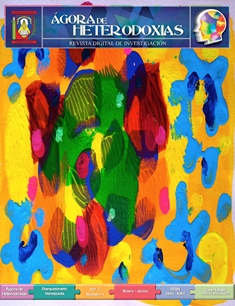Cuando el psicoterapeuta Gestalt representa a la sociedad: una experiencia de facilitación en un grupo terapéutico especial
Palabras clave:
psicoterapia, comunicación interactiva, relaciones entre grupos, grupos desfavorecidosResumen
El propósito de este relato de experiencia es, en primer lugar, describir las percepciones de un grupo de madres de hijos con Síndrome de Down de sus interacciones con personas del entramado social sin información veraz acerca de la condición; segundo, comprender el proceso de configuración de figura/fondo en el surgimiento de un diálogo en el que se resaltan las diferencias entre las participantes y la terapeuta, como fenómeno contextual que surge del nombramiento de dichas interacciones sociales. El grupo estuvo formado por 10 mujeres de entre 25 y 50 años, con hijos de entre 1 año y 6 meses y 9 años, sin experiencia previa en psicoterapia de grupo y residentes en la Riviera Maya en México. Finalmente, se realiza la discusión de estas experiencias a la luz de las teorizaciones de la Terapia Gestalt.
Descargas
Citas
Bar-Yoseph, T. (2012a). El puente: diálogo entre culturas. Sociedad de Cultura Valle-Inclán.
Bar-Yoseph, T. (2012b). Marcando la diferencia. En T. Bar-Yoseph, El puente: diálogos entre culturas. Sociedad de Cultura Valle-Inclán.
Clemmens, M., y Bursztyn, A. (2012). Cultura y cuerpo. En T. Bar-Yoseph, El puente: diálogos entre culturas. Sociedad de Cultura Valle-Inclán
Jacobs, L. (2012). Solo para blancos. En T. Bar-Yoseph, El puente: diálogos entre culturas. Sociedad de Cultura Valle-Inclán
Parlett, M. (1991). Reflections on field theory. The British Gestalt Journal, 1, 68-91. Retrieved 25 November 2021, from http://www.elementsuk.com/libraryofarticles/fieldtheory.pdf.
Perls, F. (2010). Yo, hambre y agresión. Sociedad de Cultura Valle - Inclán.
Perls, F., Hefferline, R., y Goodman, P. (2006). Terapia Gestalt: Excitación y crecimiento de la personalidad humana (3rd ed.). Sociedad de Cultura Valle-Inclán.
Sapriel, L., y Palumbo, D. (2012). Psique y cultura. En T. Bar-Yoseph, El puente: diálogos entre culturas. Sociedad de Cultura Valle-Inclán
Spagnuolo Lobb, M. (2013). El "ahora-para-lo-siguiente" en psicoterapia. Asociación Cultural Los Libros del CTP.
Teachworth, A., y Ravich, L. (2012). El lenguaje universal. En T. Bar-Yoseph, El puente: diálogos entre culturas. Sociedad de Cultura Valle-Inclán
Vázquez Bandín, C. (2014). Sin tí no puedo ser yo: pensando según la Terapia Gestalt. Asociación Cultural Los Libros del CTP.
Warburton, G., & Kuykendall, J. (2012). VIH y Cultura. En T. Bar-Yoseph, El puente: diálogos entre culturas. Sociedad de Cultura Valle-Inclán.
Wheeler, F. (2012). Cultura, Self y Campo. En T. Bar-Yoseph, El puente: diálogos entre culturas. Sociedad de Cultura Valle-Inclán.
Wollants, G. (2015). Gestalt: Terapia de la situación. Cuatro Vientos.
Yalom, I., y Leszcz, M. (2005). The Theory and Practice of Group Psychotherapy. BasicBooks.
Publicado
Cómo citar
Número
Sección

Está obra está bajo licencia Creative Commons Attribution-NonCommercial-ShareAlike 4.0 International License.
![]() Los autores mantienen los derechos para reutilizar el artículo para fines docentes y de investigación. Los lectores y usuarios pueden leer, descargar, copiar, distribuir, imprimir, buscar o usar sus publicaciones con cualquier propósito legal, sin ninguna barrera financiera, legal o técnica, además de las que son inherentes de las que implica acceder al Internet. Siempre y cuando preserven el derecho de los autores de ser adecuadamente reconocidos y citados Ágora de Heterodoxia no se hace responsable de la información suministrada por colaboradores, la cual no constituye, necesariamente, el punto de vista de la publicación.
Los autores mantienen los derechos para reutilizar el artículo para fines docentes y de investigación. Los lectores y usuarios pueden leer, descargar, copiar, distribuir, imprimir, buscar o usar sus publicaciones con cualquier propósito legal, sin ninguna barrera financiera, legal o técnica, además de las que son inherentes de las que implica acceder al Internet. Siempre y cuando preserven el derecho de los autores de ser adecuadamente reconocidos y citados Ágora de Heterodoxia no se hace responsable de la información suministrada por colaboradores, la cual no constituye, necesariamente, el punto de vista de la publicación.
Derechos del/de autor/es a partir del año de publicación
Esta obra está bajo la licencia:
Creative Commons Reconocimiento-NoComercial-CompartirIgual 4.0 Internacional (CC BY-NC-SA 4.0)




